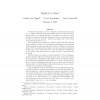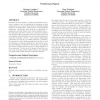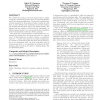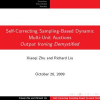SIGECOM
2009
ACM
14 years 8 months ago
2009
ACM
We consider models for bargaining in social networks, in which players are represented by vertices and edges represent bilateral opportunities for deals between pairs of players. ...
SIGECOM
2009
ACM
14 years 8 months ago
2009
ACM
We study the problem of how to allocate m identical items among n > m agents, assuming each agent desires exactly one item and has a private value for consuming the item. We as...
SIGECOM
2009
ACM
14 years 8 months ago
2009
ACM
Motivated by the prevalence of online questionnaires in electronic commerce, and of multiple-choice questions in such questionnaires, we consider the problem of eliciting truthful...
SIGECOM
2009
ACM
14 years 8 months ago
2009
ACM
SIGECOM
2009
ACM
14 years 8 months ago
2009
ACM
We consider the problem of a search engine trying to assign a sequence of search keywords to a set of competing bidders, each with a daily spending limit. The goal is to maximize ...
SIGECOM
2009
ACM
14 years 8 months ago
2009
ACM
We study the degree to which small fluctuations in costs in wellstudied potential games can impact the result of natural best-response and improved-response dynamics. We call thi...
SIGECOM
2009
ACM
14 years 8 months ago
2009
ACM
SIGECOM
2009
ACM
14 years 8 months ago
2009
ACM
The monopolist’s theory of optimal single-item auctions for agents with independent private values can be summarized by two statements. The first is from Myerson [8]: the optim...
SIGECOM
2009
ACM
14 years 8 months ago
2009
ACM
Policy teaching considers a Markov Decision Process setting in which an interested party aims to influence an agent’s decisions by providing limited incentives. In this paper, ...
SIGECOM
2009
ACM
14 years 8 months ago
2009
ACM
Voting trees describe an iterative procedure for selecting a single vertex from a tournament. vide a very general abstract model of decision-making among a group of individuals, a...








